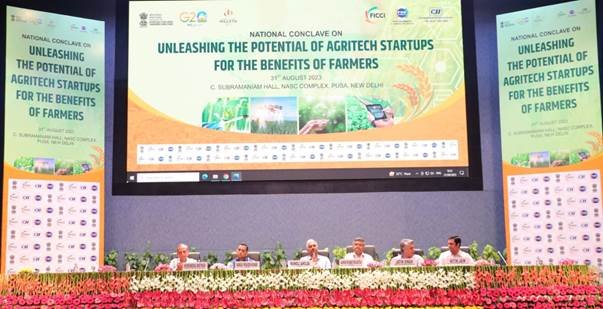INI Farms expands India’s global footprint in F&V exports Pomegranates
The container was flagged off by Rajesh Aggarwal, Additional Secretary, Ministry of Commerce and Abhishek Dev, Chairman APEDA at MSAMB’s Irradiation Facility Center in Vashi
INI Farms, India’s leading F&V exporter flagged off the first container of ‘Kimaye’ pomegranates to the USA. This is a groundbreaking development for Indian F&V exports as it marks the start of fruit exports to the USA via the sea route. Travelling nearly 20,000 km, this is the longest distance travelled by any Indian fruit in the world!
The outcome is the result of more than year-long joint efforts of APEDA, Ministry of Commerce and Industry – GOI, Ministry of Agriculture Govt of Maharashtra, Maharashtra State Agricultural Marketing Board (MSAMB), United States Department of Agriculture APHIS (USDA APHIS), NPPO, Pomegranate National Research Center and INI Farms. This encompassed various initiatives from farm registrations, training & monitoring, air shipment trials, development of sea protocol, static trials for shelf life extension and post-harvest treatment.
The container was flagged off by Rajesh Aggarwal, Additional Secretary, Ministry of Commerce and Abhishek Dev, Chairman APEDA at MSAMB’s Irradiation Facility Center in Vashi (Navi Mumbai). The event was graced by dignitaries from MSAMB, Regional Plant Quarantine Station (RPQS – MoA&FW), US Consulate and US International Development Finance Corporation (DFC), APEDA and NRC Solapur. The consignment of 4200 boxes (12.6 tons) of ‘Kimaye’ pomegranates is set to sail to delight customers in the US
Today, India is the world’s largest producer of pomegranates, with over 2,75,500 hectares of land under cultivation. During the fiscal year 2022-23, the country exported over 60,000 metric tonnes of pomegranates to countries like UAE, the Netherlands, Oman, Bahrain and others. The successful export of pomegranates to the USA opens up a new opportunity for Indian pomegranate farmers and exporters and will open doors to other long-distance markets like Australia.
The container was flagged off by Rajesh







